新融合大学英语综合教程3拓展材料-Unit 1
- 格式:doc
- 大小:14.00 KB
- 文档页数:1
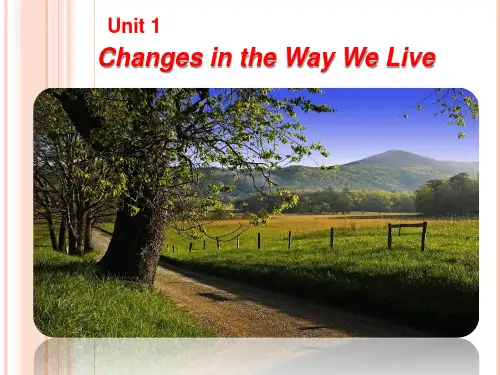
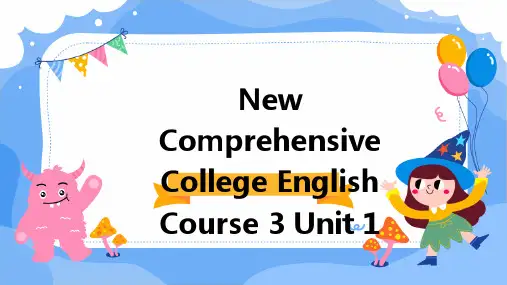
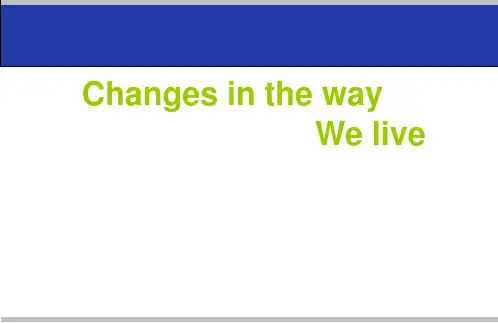

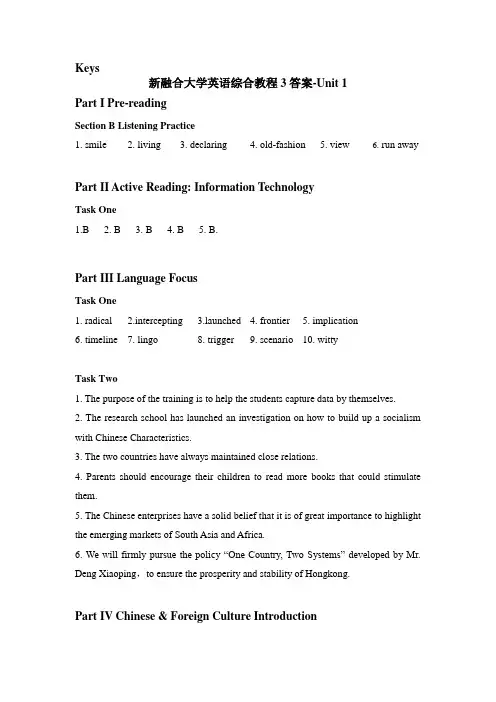
Keys新融合大学英语综合教程3答案-Unit 1Part I Pre-readingSection B Listening Practice1. smile2. living3. declaring4. old-fashion5. view6. run awayPart II Active Reading: Information TechnologyTask One1.B2. B3. B4. B5. B.Part III Language FocusTask One1. radical2.interceptingunched4. frontier5. implication6. timeline7. lingo8. trigger9. scenario 10. wittyTask Two1. The purpose of the training is to help the students capture data by themselves.2. The research school has launched an investigation on how to build up a socialism with Chinese Characteristics.3. The two countries have always maintained close relations.4. Parents should encourage their children to read more books that could stimulate them.5. The Chinese enterprises have a solid belief that it is of great importance to highlight the emerging markets of South Asia and Africa.6. We will firmly pursue the policy “One Country, Two Systems” developed by Mr. Deng Xiaoping,to ensure the prosperity and stability of Hongkong.Part IV Chinese & Foreign Culture IntroductionTask OneIn ancient times in China, file transfer was generally by post. You could usually find a station every 20 li. If there were official documents marked with “Send Immediately”, the documents should cover 300 li a day according to the specified rules or requirements. If it was extremely urgent, the documents could be delivered at speeds up to 400, 600, and at the most 800 li per day. While transferring emergency files, each station would select the swiftest horse, and thus every horse, even if it could be an ordinary one, would devote itself to running at a speed of almost 1000 li.Since then, the phrases “Urgent in Six Hundred Li”, and “Urgent in Eight Hundred Li” have been used to represent different degrees of an emergency.Task Two在失宠数年之后,“人工智能”这个词好像在准备着东山再起。
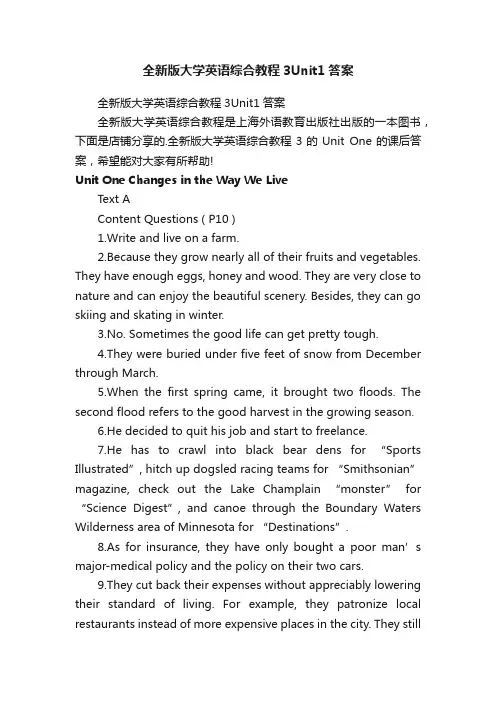
全新版大学英语综合教程3Unit1答案全新版大学英语综合教程3Unit1答案全新版大学英语综合教程是上海外语教育出版社出版的一本图书,下面是店铺分享的.全新版大学英语综合教程3的Unit One的课后答案,希望能对大家有所帮助!Unit One Changes in the Way We LiveText AContent Questions ( P10 )1.Write and live on a farm.2.Because they grow nearly all of their fruits and vegetables. They have enough eggs, honey and wood. They are very close to nature and can enjoy the beautiful scenery. Besides, they can go skiing and skating in winter.3.No. Sometimes the good life can get pretty tough.4.They were buried under five feet of snow from December through March.5.When the first spring came, it brought two floods. The second flood refers to the good harvest in the growing season.6.He decided to quit his job and start to freelance.7.He has to crawl into black bear dens for “Sports Illustrated”, hitch up dogsled racing teams for “Smithsonian” magazine, check out the Lake Champlain “monster” for “Science Digest”, and canoe through the Boundary Waters Wilderness area of Minnesota for “Destinations”.8.As for insurance, they have only bought a poor man’s major-medical policy and the policy on their two cars.9.They cut back their expenses without appreciably lowering their standard of living. For example, they patronize local restaurants instead of more expensive places in the city. They stillattend the opera and ballet but only a few times a year. They eat less meat, drink cheaper wine and see fewer movies.10.A tolerance for solitude and lots of energy.11.They will leave with a feeling of sorrow but also with a sense of pride at what they have been able to accomplish.12.They chose to live in the country because they want to improve the quality of their lives. Yes, they have finally realized their dreams.Text Organization ( P11 )Part One (paragraphs 1—3) The writer views his life in the country as a self-reliant and satisfying one.Part Two (paragraphs 4—7 ) Life in the country is good yet sometimes very hard.Part Three (paragraphs 8—11) After quitting his job, the writer’s income was reduced, but he and his family were able to manage to get by.Part Four (paragraphs 12—15 ) A tolerance for solitude and a lot of energy have made it possible for the family to enjoy their life in the country.Happy Moments and Events1) growing nearly all their fruits and vegetables2) canoeing, picnicking, long bicycle rides, etc.3) keeping warm inside the house in winter4) writing freelance articles5) earning enough money while maintaining a happy family lifeHardships1) working hard both in winter and in summer2) harsh environment and weather condition3) anxious moments after the writer quit his job4) cutting back on daily expenses5) solitudeVocabulary1. Fill in the gaps with words or phrases given in the box. ( P15 )1) on balance 2) resist 3) haul 4) wicked5) illustrated 6) budget 7) lowering 8) boundary9) involved 10)economic 11) blasting 12) just about2. Now use the verb in brackets to form an appropriate phrasal verb you have learned and complete the sentence with it. ( P16 )1) cut back / down 2)pick up3)get by 4) get through5)face up to 6)turn in7)making up for 8)think up3. Rewrite each sentence with the word or phrase in brackets, keeping the same meaning. (P17 )1) pursued his mathematical studies and taught himself astronomy.2) often generate misleading thoughts.3) attach great importance to combining theory with practice in our work.4) be suspected of doing everything for money.5) before he gets through life.4. Complete the sentences, using the words or phrases in brackets ( P17 )1. their indoor a profit to invest in2. device the improvement on a global scale3. stacked temptation never dined outConfusable Use ( P18 )1.house2.home3.home family4.household1.doubt2.suspected3.doubted4.suspected5.suspectWord Formation ( P19 )1) rise 2) final 3) regular 4) cash 5) hows and whys6) upped 7) yellowed 8) bottled 9) lower 10) searchCloze1. Text-related ( P20 )1) gets by 2) temptation 3) get through4) improvement 5) aside from 6) suspect7) supplement 8) profit 9) stacking2. Theme-related ( P21 )1) replaced 2) consider 3) quit4) world 5) tough 6) fuels7) provide 8) luxuries 9) balance10) idealTranslation1. Translate the sentences into English ( P21 )1) We have a problem with the computer system, but I think it is fairly minor.2) My father died when I was too young to live on my own. The people of my hometown took over responsibility for my upbringing at that point.3) the toys have to meet strict safety requirements beforethey can be sold to children.4) Radio and television have supplemented rather than replaced the newspaper as carriers of new and opinion.5) When it comes to this magazine, it is a digest of articles from many newspapers and magazines around the world.2. Translate the passage into English ( P21 )A decade ago,Nancydid what so many Americans dream about. She quit an executive position and opened a household device store in her neighborhood. People likeNancymade the decision primarily for the improvement in the quality of their lives.But, to run a business on a small scale is by no means an easy job. Without her steady income,Nancyhad to cut back on her daily expenses. Sometimes she did not even have the money to pay the premiums for the various kinds of insurance she needed.Fortunately, through her own hard work, she has now got through the most difficult time. She is determined to continue pursuing her vision of a better life.Text B1. Choose the best answer for each of the following. ( P27 )1—6. a c d b a cTranslate into Chinese the underlined sentences in the essay ( P28 )1.什么? 你说那听起来不像你府上的生活?其实,不仅仅是你一个人这么想。

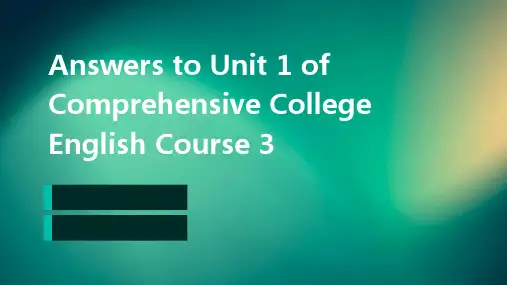
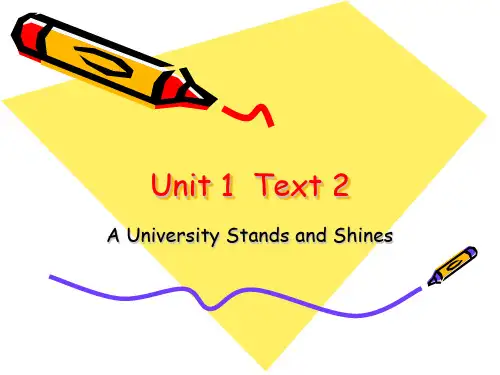
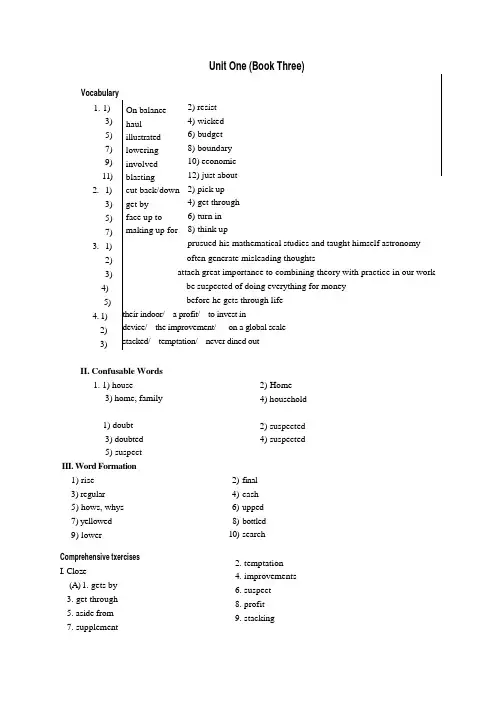
(B)1. replace2. consider3. quit4. worlds5. tough6. fuels7.provide8.luxuries9.balance10.idealII. Translation1. 1. We have a problem with th ecomputer system, but I think it’s fairly minor.2. My father died when I was too young to live on my own. The people of myhometown took over (responsibility for) my upbringing at that point.3. The toys have to meet strick/tough safety requirements before they can ba sold tochildren.4. Radio and televition have supplemented rather than replaced the newspaper ascariers of news and opinion.5. When it comes to this magazine, it is/carries a digest of articles from manynewspapers and magazines around world.2. A decade ago, Nancy did what so many Americans dream about. She quit anexecutive position and opened / set up a household equipment store in her neighborhood. People like Nancy made the decision primarily because of/owing to/due to their desire to improve the quality of their lives.But, to run a small business is by no means an easy job. Without her steady income, Nancy had to cut back on her daily expenses. Sometimes she did not even have the money to pay the premiums for the various kinds of insurance she needed. Once she could not even pick up the phone bill and had to ask her parents to loan her some money.Fortunately, through her own hard work, she has now got through the most difficult time.She is determined to continue pursuing her vision of a better life.Recent Changes in Chinese Family Life (Model paper) Great changes have taken place in Chinese family life in the past twenty years. In my parents' words, the difference between their childhood and mine is as vast as that between heaven and earth.When my parents were young, there was no TV, no computers nor any other electronic appliances in their home. Their food was simple and their clothing plain. What is unbelievable to young people today is that they seldom dined out in a restaurant, or traveled to a scenic spot for a holiday.In contrast to family life one generation ago, each family in China today has at least one TV set and many have been equipped with telephones, computers, even cars. While the senior members of a family watch films on TV at home, the younger members like to play computer games or talk to their friends who may live thousands of miles from them.The changes in Chinese family life mirror the economic development of our country. Without the prosperity of the whole country, our family life would probably be just the same as before. Times have changed, and changed, most would surely agree with me, for the better. (194 words)。
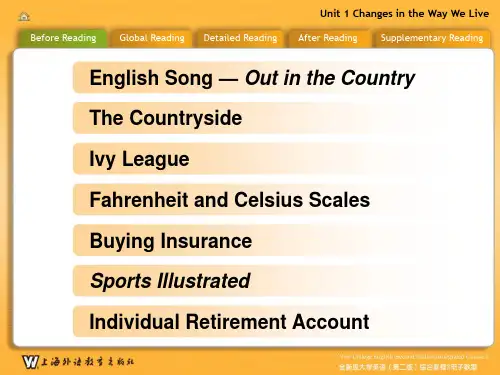
Keys新融合大学英语综合教程3答案-Unit 1Part I Pre-readingSection B Listening Practice1. smile2. living3. declaring4. old-fashion5. view6. run awayPart II Active Reading: Information TechnologyTask One1.B2. B3. B4. B5. B.Part III Language FocusTask One1. radical2.interceptingunched4. frontier5. implication6. timeline7. lingo8. trigger9. scenario 10. wittyTask Two1. The purpose of the training is to help the students capture data by themselves.2. The research school has launched an investigation on how to build up a socialism with Chinese Characteristics.3. The two countries have always maintained close relations.4. Parents should encourage their children to read more books that could stimulate them.5. The Chinese enterprises have a solid belief that it is of great importance to highlight the emerging markets of South Asia and Africa.6. We will firmly pursue the policy “One Country, Two Systems” developed by Mr. Deng Xiaoping,to ensure the prosperity and stability of Hongkong.Part IV Chinese & Foreign Culture IntroductionTask OneIn ancient times in China, file transfer was generally by post. You could usually find a station every 20 li. If there were official documents marked with “Send Immediately”, the documents should cover 300 li a day according to the specified rules or requirements. If it was extremely urgent, the documents could be delivered at speeds up to 400, 600, and at the most 800 li per day. While transferring emergency files, each station would select the swiftest horse, and thus every horse, even if it could be an ordinary one, would devote itself to running at a speed of almost 1000 li.Since then, the phrases “Urgent in Six Hundred Li”, and “Urgent in Eight Hundred Li” have been used to represent different degrees of an emergency.Task Two在失宠数年之后,“人工智能”这个词好像在准备着东山再起。
2015/9/15Discussion: First days at collegeUnit 1 Fresh Start• Do you remember your first days at college? Did anything special happen then? • What are the major differences between college and high school lives? • What do you expect to obtain in college?JOANNEStudy focus• Topics and background: • What is college for? Or What is the essence of a college? • What are the differences of Chinese universities and universities overseas? • Language: • Vivid descriptions of mentalities and actions. • Humor of the language.Text: A general look• What is the genre of the text? Narration - An narrative writing describes a sequence of real and unreal events. - The author recounts her embarrassing moments during her first days of college. She gives us detailed accounts of the process of 3 incidents, the after-effect and the significant insight into herself.Global reading - organization• Chronologically described: – Arriving at campus – Three embarrassing events – I have realized… 1. going into a wrong classroom; 2. falling down in the cafeteria; 3. witnessing the same embarrassing fall of football player;Details - 1. arriving at college• How did she feel? • A bit first-gradish, distressful, uncomfortable, nervous, cautious, excited… • Why did she have the impression that “everyone on campus was watching me”? • She was over-sensitive, uneasy with her identity as a newcomer. She thought new students would attract others’ attention.12015/9/15Paraphrase• Adding to my distress was the distinct impression that everyone on campus was watching me. I could clearly feel that everyone on campus was watching me, and this made me even more upset.Language work: distinct• distinct • clearly seen, heard, felt, understood, etc.; noticeable, different – E.g., The children have distinct memories of their grandfather in his last days. – E.g., Now that the boss was no longer present, there was a distinct change in her attitude. • be distinct from/indistinct & distinctive• distinctive • a thing or quality that is so special because it is clearly different from others of its kind. – E.g., Beer has a very distinctive smell; it’s quite distinct from the smell of wine. • distinctly: adv. • distinction: n. -- 本书特点之一就是具有清楚明了的图解。
新融合大学英语综合教程3拓展材料-Unit 1
Part I Pre-reading
Section C Recitation
Directions: Read the article and try to recite it.
The paradox of our time in history is that we have taller buildings, but shorter tempers; wider freeways, but narrower viewpoints; we spend more, but have less; we buy more but enjoy less.
We have bigger houses and smaller families; more conveniences, but less time; we have more degrees, but less sense; more knowledge, but less judgment; more experts, but more problems; more medicine, but less wellness.
We’ve learned to rush, but not to wait; we have higher incomes, but, lower morals.
We build more computers to hold more information to produce more copies than ever, but have less communication; we’ve become long on quantity, but short o n quality.
Section D More fun
Directions: Appreciate the funny story.
Camera
On our way to a wedding in Vermont, my husband and I realized we had forgotten our camera. We stopped at a general store and, hoping to purchase a cheap, disposable model. Sal asked the owner, “Do you have any of those throwaway cameras?”
“Look, fellow,” replied the owner, “I don’t care what you do with it after you buy it.”。